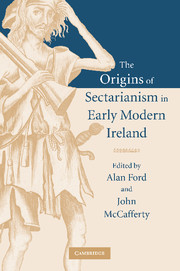Book contents
- Frontmatter
- Contents
- Preface
- List of contributors
- List of abbreviations
- 1 Living together, living apart: sectarianism in early modern Ireland
- 2 Confessionalisation in Ireland: periodisation and character, 1534–1649
- 3 Protestant prelates or godly pastors? The dilemma of the early Stuart episcopate
- 4 ‘In imitation of that holy patron of prelates the blessed St Charles’: episcopal activity in Ireland and the formation of a confessional identity, 1618–1653
- 5 A haven of popery: English Catholic migration to Ireland in the age of plantations
- 6 The Irish historical renaissance and the shaping of Protestant history
- 7 Religion, culture and the bardic elite in early modern Ireland
- 8 The political and religious thought of Florence Conry and Hugh McCaughwell
- 9 Sectarianism: division and dissent in Irish Catholicism
- 10 Purity of blood and purity of faith in early modern Ireland
- 11 Concluding reflection: confronting the violence of the Irish reformations
- Index
2 - Confessionalisation in Ireland: periodisation and character, 1534–1649
Published online by Cambridge University Press: 24 November 2009
- Frontmatter
- Contents
- Preface
- List of contributors
- List of abbreviations
- 1 Living together, living apart: sectarianism in early modern Ireland
- 2 Confessionalisation in Ireland: periodisation and character, 1534–1649
- 3 Protestant prelates or godly pastors? The dilemma of the early Stuart episcopate
- 4 ‘In imitation of that holy patron of prelates the blessed St Charles’: episcopal activity in Ireland and the formation of a confessional identity, 1618–1653
- 5 A haven of popery: English Catholic migration to Ireland in the age of plantations
- 6 The Irish historical renaissance and the shaping of Protestant history
- 7 Religion, culture and the bardic elite in early modern Ireland
- 8 The political and religious thought of Florence Conry and Hugh McCaughwell
- 9 Sectarianism: division and dissent in Irish Catholicism
- 10 Purity of blood and purity of faith in early modern Ireland
- 11 Concluding reflection: confronting the violence of the Irish reformations
- Index
Summary
This chapter offers an interpretation of Irish history in the sixteenth and seventeenth centuries by a historian who was trained in the German historiographical tradition. This is a tradition which is in many respects different from that of Ireland, Britain and North America: ‘German historians have an industry they call ‘Periodisierung’ (periodisation) and they take it very seriously’ – thus the English historian C. H. Williams in 1967. ‘Periodisation’, the definition of historical periods and the discussion of their usefulness in historiographical debate, has a long tradition in German historiography. In order to justify their interest in periodisation German historians argue that, as Wolfgang Reinhard has put it, ‘even the most pragmatic and rather arbitrary selection of two years to identify a portion of history could result in the smuggling of some theoretical concept into apparently factual statements’. For example, choosing dynastic dates as limits for a book on the history of any European country in the early modern period implies different things: that the rule of a certain dynasty constitutes a unified epoch in this country's history or, more generally, ‘that crown and dynasty are the factors which really matter’. Consequently, German historians argue, periodisations and their underlying concepts and interpretations have to be constantly discussed and, if necessary, revised. This is the other ‘industry’ of German historiography: the development of theoretical concepts in order to explain and categorise historical phenomena and processes, which is often closely connected with discussions on periodisation.
- Type
- Chapter
- Information
- The Origins of Sectarianism in Early Modern Ireland , pp. 24 - 53Publisher: Cambridge University PressPrint publication year: 2005
- 2
- Cited by



